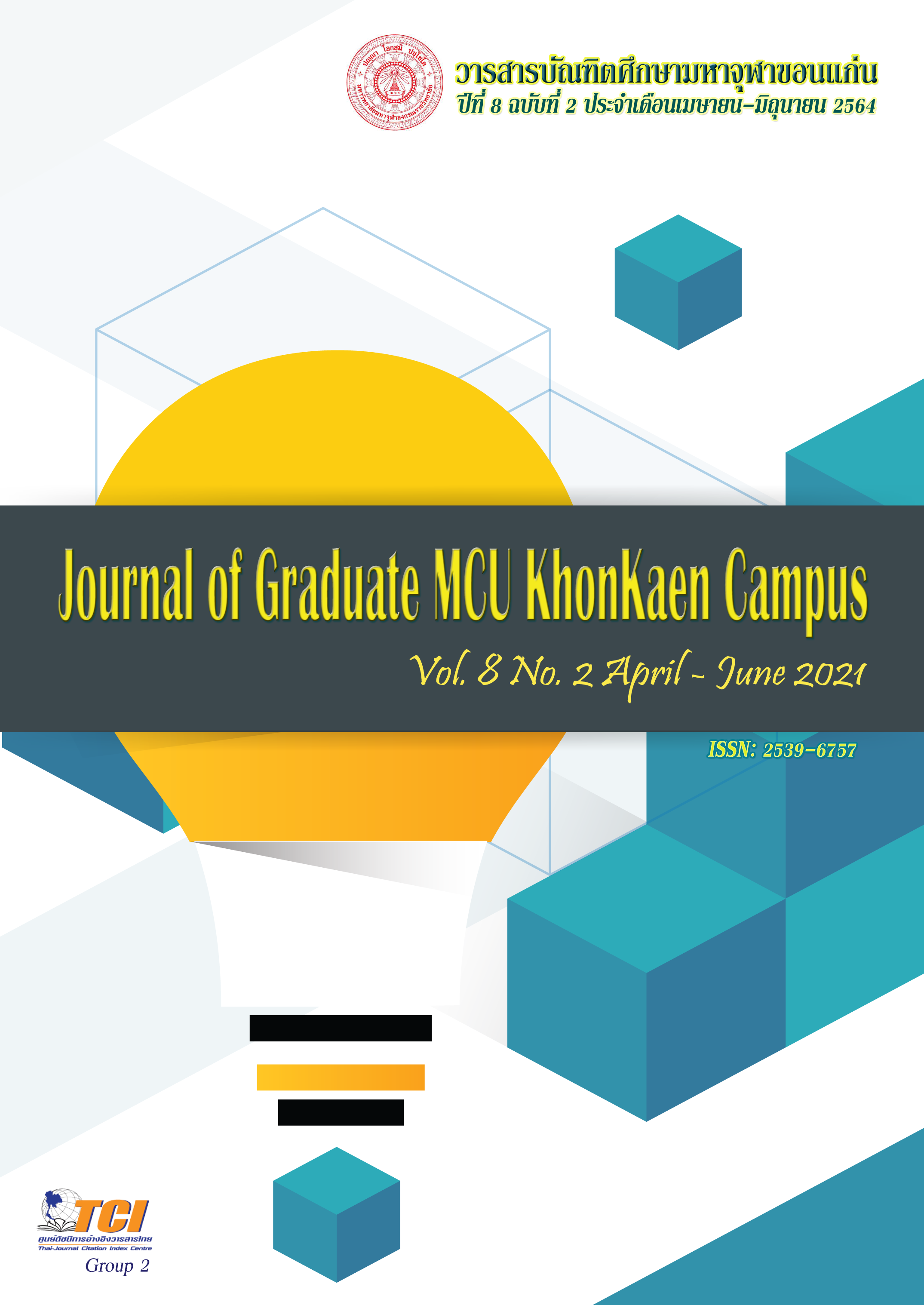HUMAN DEVELOPMENT ACCORDING TO BUDDHIST ETHICS
Main Article Content
Abstract
The objectives of this research are 1) to study the problem of human development 2) to study Buddhist ethics in human development according to 3) to analyze human development according to Buddhist ethics. It is a documentary research. By collecting data from primary and secondary documents. Data analysis by descriptive according to the inductive ditch
The research results were found that
The problem of human development is living in the globalized era. Society puts too much emphasis on the human body. By neglecting the human development of the mind. Thus causing many social problems. When humans are composed of body and mind Human development must develop both physical and mental at the same time in order to achieve balance.
The principle of Buddhist ethics in human development refers to the Buddhist teachings used in human development both physically and mentally. In order to achieve balance, there are 4 principles of prayer, which consist of physical prayer, spiritual development, spiritual development, spiritual development, spiritual development. And wisdom pray Is the development of intelligence
Human development according to Buddhist ethics It refers to the application of the 4 principles of prayer for human development in four areas: 1) Kayabhavana is to build relationships with the physical environment by persistence, concentration and wisdom. 2) Silabravana is the development of behavior for Discipline Do not persecute others. 3) Jittabhavana is the mental development to be strong, quality, and capable.
4) Panyabravana is to aware of the world and life according to circumstances, escaping himself from suffering, solve problems that arise with wisdom.
Article Details
References
เจริญ ช่วงชิต. (2557). การศึกษาสมาธิในพระพุทธศาสนาเถรวาท. ใน พุทธศาสตรดุษฎีบัณฑิต, สาขาวิชาพระพุทธศาสนา, บัณฑิตวิทยาลัย: มหาวิทยาลัยมหาจุฬาลงกรณราชวิทยาลัย.
ณอภัย พวงมะลิ. (2561). การพัฒนาทรัพยากรมนุษย์โดยการปฏิบัติวิปัสสนากรรมฐานตามแนวสติ ปัฏฐาน 4 ของศูนย์ปฏิบัติวิปัสสนากรรมฐานวัดถ้ำพระผาคอก อำเภอเวียงชัย จังหวัดเชียงราย. ใน ปรัชญาดุษฎีบัณฑิต, บัณฑิตวิทยาลัย: มหาวิทยาลัยราชภัฏเชียงใหม่.
ธนา มณีพฤกษ์. (2561). ความล้มเหลวของการนำนโยบายไปปฏิบัติ กรณีศึกษานโยบายการสร้างงานในเมืองโอ๊คแลนด์ รัฐแคลิฟอร์เนีย สหรัฐอเมริกา. การประชุมหาดใหญ่วิชาการระดับชาติและนานาชาติ ครั้งที่ 9. วันที่ 20 – 21 กรกฎาคม พ.ศ. 2561.
พระครูวิจิตรปทุมรัตน์ (ปญฺญาทีโป), (2558). การพัฒนาคุณภาพชีวิตตามหลักพระพุทธศาสนา. วารสารครุศาสตร์ปริทรรศน์, 2(1), 90-95.
มหาจุฬาลงกรณราชวิทยาลัย. (2539). พระไตรปิฎกภาษาไทย ฉบับมหาจุฬาลงกรณราชวิทยาลัย. กรุงเทพมหานคร: โรงพิมพ์มหาจุฬาลงกรณราชวิทยาลัย.
ยุงยุทธ แสนประสิทธิ์. (2554). รูปแบบการป้องกันความรุนแรงในครอบครัวโดยกระบวนการมีส่วนร่วมของครอบครัวและชุมชน : กรณีศึกษาชุมชนแห่งหนึ่งในปทุมธานี. ใน วิทยาศาสตรดุษฎีบัณฑิต. บัณฑิตวิทยาลัย: มหาวิทยาลัยศรีนครินทรวิโรจน์.
สุขพัชรมณี กันแต่ง. (2561). การวิเคราะห์ปัจจัยเชิงสาเหตุที่มีความสัมพันธ์กับการได้รับความรุนแรงทางด้านร่างกายของสตรีในจังหวัดพิษณุโลก. วารสารสำนักหอสมุดมหาวิทยาลัยทักษิณ, 7(1), 67-68 .

